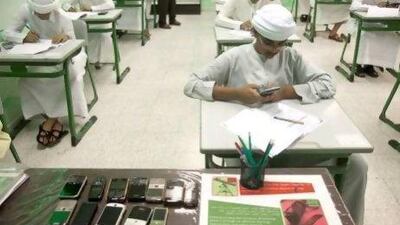DUBAI // Schoolchildren are using more sophisticated methods to cheat, including smartphones, wireless Bluetooth headsets and tiny, concealed cameras, education authorities say.
And school principals say the threat of suspension ordered recently by the Ministry of Education is failing to deter pupils, who believe they will not be caught with such devices.
"Pupils used to write on their hands or small chits before," said Taleb Al Attas, the principal of Al Ittihad Model School for boys in Abu Dhabi. "Now they use these small equipments, which makes it difficult for us."
Mr Al Attas gave the example of a pupil acting suspiciously during midterm exams in December.
"This child had taped his phone inside his ghutra [head covering] and was receiving answers from another person sitting in an air-conditioned car outside the school," he said.
Pupils were also found with pen cameras, which are widely sold.
Another principal at a government school in Ras Al Khaimah said teachers were constantly counselling children against cheating and plagiarism.
"You cannot stop the practice of cheating 100 per cent," said Mohammed Mulla, who did not want his school identified. "Despite repeated warnings they do not listen. We keep seeing dishonest behaviour during examinations."
Mr Mulla said the biggest giveaway was a pupil who looked distracted: "They keep twisting their head or whistle to others, and more commonly write things on small chits and hide them in their socks."
But the more modern devices were much harder to spot, he said.
Ministry officials say cheating has long been rampant in state and private schools.
Under ministry guidelines issued last year, a child found cheating will not be allowed to continue the exam and may be barred from future tests. Parents have to give a written undertaking that there will be no recurrence.
If caught a second time, pupils can be given five days of community service and suspended from school.
Plagiarism is also rife and on the rise, said Niloofer Rouhani, a sociologist and educator in Dubai.
"Although technology has made it easier for teachers and professors to catch plagiarism, it has also made it easy for youth to copy and paste other people's work," said Ms Rouhani, who has two school-age children.
"We should see why the ethical standards of our youth have deteriorated instead of trying to play catch-up with savvy students."
Al Ittihad Model School tries to help students caught cheating before reprimanding them. "Pupils who do not perform well tend to cheat and so we offer extra classes to them to avoid this," said Mr Al Attas.
"If this still happens we involve his parents and try to make them understand that it will spoil his future, and have our social workers counsel him."
Mr Mulla's school promotes group working, which he says is less stressful.
But the message is still not getting through. One 16-year-old at a state school in Ajman said he saw nothing wrong with his serial cheating.
"I was just asking a few answers because I had not studied that chapter and it was from my friend sitting behind," he said.
The pupil said he had heard about cheap Bluetooth devices that others were using.
"I have not tried it yet, but my friend showed it to me and it's really cool," he said.

